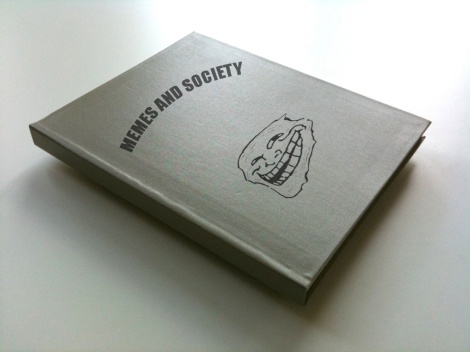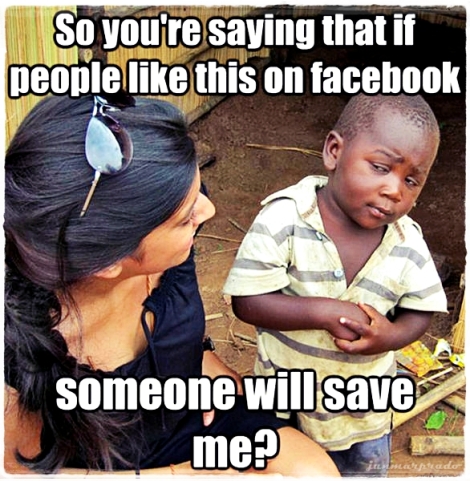
In our present-day society where an increasing amount of interaction with each other is through iPhones, Facebook or Twitter and with an ever-growing number of the world’s Internet users, the dynamics of social interaction, popular culture and communication have changed significantly. New technologies allow new ways and forms of communication and interaction, an example being Internet memes that have arisen from the popularity of the Internet.
Memes as a unit of cultural transmission
Patrick Davison, in The Social Reader explains that similar to how genes are the most basic unit that determines an organism’s physical attributes, memes are building blocks that determines the behaviour of an organism. These memes – or “offline memes” as Mandiberg calls them – are precursors to their Internet cousins and comprise “cultural cornerstones” such as language or religion, behaviour that is either taught or learnt through self-experience.
Comparing genetic changes with how memes are passed from one person to another, Mandiberg says that memes are hyperfast in terms of the speed of transmission, only to be sped up exponentially with the Internet. This was summed up nicely by Technology writer Karl Hodge who says, “Memes are the very building blocks of culture. Not every meme is a big idea, but any meme with the right stuff can go global once it hits the Internet”.
The agency of memes in society
Keeping in mind that Internet memes are basically the transmission of culture and knowledge on steroids, it is probably worth looking into the significance and agency that they hold to society. Chris Chesher, a Professor in Digital Cultures at the University of Sydney theorises that a Internet meme’s agency in society is a manifestation of an iteration of Roland Barthes‘ concept of the punctum. He argues that the feature of an image (or moving image) that wounds or punctures the viewer, exposes the common experiences and situations people face in life – thus experiencing the meme reveals something that individuals already have but are unable to articulate.
If that was too abstract an explanation for you, what Chesher was basically trying to say is that Internet memes which manage to catch on with the mainstream invoke some form of familiarity and relatability with the individuals exposed to it, this then compels them to share and replicate the memes as they articulate common experiences and feelings.
So then, how else are Internet memes significant to society? Well, this might sound like a stretch, but I would say that just like how archaeologists and historians gain understanding of human life in Roman times by studying the frescos and murals of Pompeii, Internet memes would be able to provide historians of the future hints to popular trends, political views, norms and habits of this period’s society. It would be interesting to see if humanity manages to achieve a utopian society in the future, free of disease and poverty, and their reaction to our use of humour in first-world problem and skeptical third-world kid memes.

Not sure how well this would go down with web users of the future.
Source: georgecalin.ro
Internet memes can also translate into some serious money. In an open panel discussion held at the Internet Week festival in New York this year, media gurus Todd Sawicki from Cheezeburger, Digital Advertiser Kirsten Maverick, and Creative Technologist Rey Peralta talked about the importance of Internet memes to the advertising industry and how agencies that understand the Internet are using them to strengthen their brands and position in the market.
The panel discussed the evolution of Internet memes and new ways in which Internet memes can be employed to reach consumers, which reflects how something that comes across as inane Internet-clutter can translate to big business and provide one with a tangible value.
Are Internet memes here to stay?
Having seen the importance of Internet memes, how then do we know that it’s not simply a fad that will cease to exist in the future? When posed with this question, Dr Chesher had this to say:
Cultural forms tend to shift, get contested, and change in meaning (such as the recent discussion of trolls). I’m not sure the ‘meme’ has much stability. I think its meaning has changed over the past decade from a more all-encompassing concept of cultural patterns that parallel genetic patterns, towards a more trivial concept of internet memes that circulate.
So whether what you ‘re making your own meme on meme generator is “trivial” or not, the next time you actually do replicate or produce a meme, you could see yourself transmitting culture rather than simply wasting your time.
ATM’s Beyond the Memes is an investigatory series in which we delve into the phenomenon of internet memes. We’re always on the lookout for more mysteries, so if there’s an interesting aspect of memes that you would like to see explored, let us know via twitter @allthememes_.
